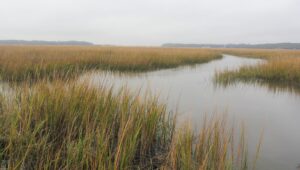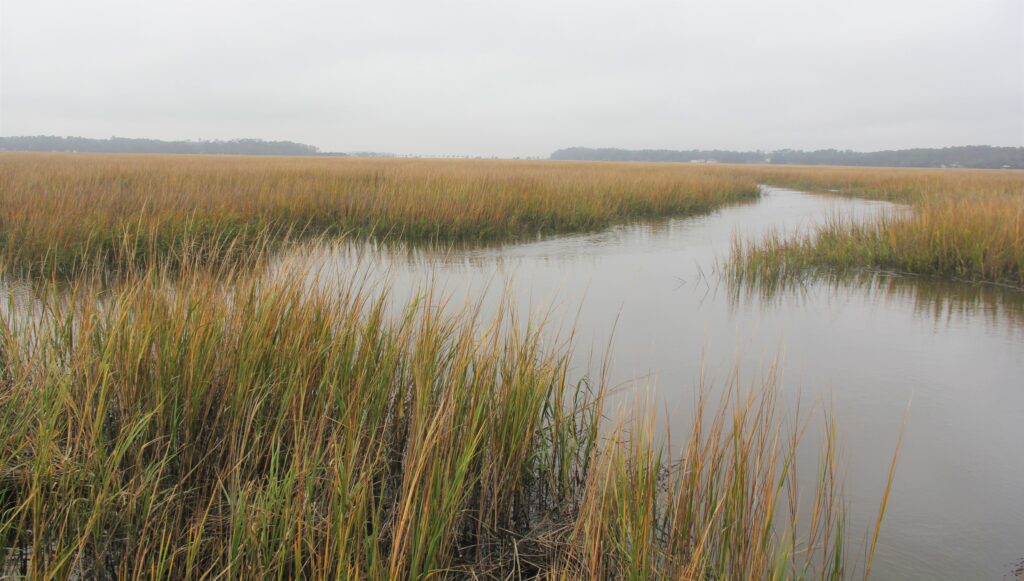By Belén Wilson
The United States southeastern coast is known for its beautiful barrier islands and unique marshlands. Though some of these islands have been preserved, many are now home to luxury resorts, hotels, and even modern retirement communities.[1] While boom in development brings tourism to the islands, it comes at a painful cost to some of the coasts’ original community members, the Gullah/Geechee, who are fighting for ownership of their ancestral lands.[2] The lack of protection the law affords to heirs’ property owners is responsible for the displacement of these local communities.[3]
The Gullah/Geechee are descendants of West African slaves who were brought to plantations on the southeastern coast of the United States, stretching from Wilmington, North Carolina to Jacksonville, Florida.[4] These diverse people came from many ethnic groups; the nature of their enslavement on isolated islands created a unique culture with its own language that is still used today.[5] This culture flourished during the Civil War, during which conflict plantation owners deserted their coastal properties.[6] Their abandonment allowed the Gullah/Geechee to purchase the land, consequentially becoming the first African Americans to own large amounts of land in the United States.[7] This land was then passed down generationally, though primarily done without legal title.[8] When property is devised without an effective deed or will, but rather passed down generationally in a family, it becomes heirs’ property.[9] Accordingly, heirs’ property is a form of tenancy in common whereby familial descendants receive a fractional interest in the land, like a share of a company’s stock.[10]
As generations pass, more heirs acquire an interest in the property, which causes unstable ownership because each heir possesses an unrestricted right to request a partition by sale of the property.[11] This right to partition is particularly harmful to Gullah/Geechee communities, whose residencies on the coast are prime targets for real estate developers.[12] Since all heirs own an interest in the property, a developer simply has to find one descendant and convince them to sell their share.[13] If successful, this can force the sale of the entire property, causing the legal displacement of the heirs who live and have lived on the property for years.[14] Once the developer buys a share from a willing heir, the developer can order a partition sale, which are typically forced public sales that yield below market value.[15] Courts that order these sales often do not consider the property’s ancestral value or broader historical and cultural significance.[16]
Partition sales of heirs’ property are one of the leading causes of involuntary land loss within the African American community.[17] This loss of land prevents families from creating intergenerational wealth; researchers estimate African American property owners have lost billions of dollars and millions of acres of land through heirs’ property auctions.[18] Despite this significant land loss, there was no meaningful legal reform until 2010 when the Uniform Law Commission enacted the Uniform Partition of Heirs Property Act (“UPHPA”), which provides due process protections to heirs’ property owners.[19] Though it’s been eleven years since its passage, only eighteen states have adopted a version of the UPHPA.[20]
However, this year, seven states introduced a version of the UPHPA to their state legislatures, with North Carolina—a Gullah home state—being one of them.[21] Many attorneys are working hard to protect heirs’ property rights, but the devasting amount of land loss and communal displacement showcases the need for legislative reform.[22] While development along the coast is desirable, it must be balanced against the need to preserve the culture, language, and history of local communities. The Gullah/Geechee are just one of many communities in the United States suffering from the inadequate protection of heirs’ property ownership,[23] and until there is reform they will remain susceptible to property and culture loss.
[1] For example, Hilton Head Island, where there is a large Gullah community, promotes its array of accommodations, ranging from luxurious resorts to exclusive beachfront homes and villas. See Where to Stay on Hilton Head Island, SC, Hilton Head Chamber of Com. & Visitor and Convention Bureau, https://www.hiltonheadisland.org/stay (last visited Apr. 1, 2021).
[2]See Brian Wheeler, Gullah Geechee: Descendants of Slaves Fight for Their Land, BBC News (Dec. 5, 2016), https://www.bbc.com/news/magazine-37994938. The origin of the terms “Gullah” and “Geechee” are disputed, but it is generally accepted that Gullah people are located in coastal South Carolina while Geechee live along the Georgia coast and into Florida. Id.
[3] Michelle Chen, Black Lands Matter: The Movement to Transform Heirs’ Property Laws, The Nation (Sep. 25, 2019), https://www.thenation.com/article/archive/heirs-property-reform/ (“[T]he Gullah . . . have seen their ancestral lands . . . virtually vanish through the attrition of heirs’ property.”). For a recent video on how heirs’ property affects Gullah property owners, see Disrupt and Dismantle: The Battle for Black Land, Bet (Mar. 12, 2021), https://www.bet.com/video/disrupt-and-dismantle/season-1/full-episodes/episode-103-the-battle-for-black-land.html.
[4] The Gullah Geechee, The Gullah Geechee Cultural Heritage Corridor Comm’n, https://gullahgeecheecorridor.org/thegullahgeechee/ (last visited Apr. 26, 2021).
[5] Id. Since these Africans came from “more than two dozen ethnic groups and sp[oke] forty different languages, communication among slaves at first was difficult.” Faith R. Rivers, The Public Trust Debate: Implications for Heirs’ Property Along the Gullah Coast, 15 Se. Env’t. L. J. 147, 151 (2006) (quoting Walter Edgar, South Carolina a History 71 (1998)). “Accordingly, African Americans were forced by circumstance to develop their own means of communication, which led to the development of a creole language termed ‘Gullah.’” Id.
[6] SemDem, The Gullah-Geechee Have Owned Land Since the 1800s. One Terrible Law Allows Their Land to Be Stolen, DailyKos (Aug. 1, 2020, 10:29 AM), https://www.dailykos.com/stories/2020/8/1/1960612/-The-Gullah-Geechee-have-owned-land-since-the-1800s-One-terrible-law-allows-their-land-to-be-stolen (stating that most plantation owners abandoned their land when the Civil War broke out).
[7] Rivers, supra note 5, at 154 ( “A significant number of Gullah heirs’ property owners can trace their ownership back to land purchases by former slaves during the Civil War and the Reconstruction period.”); DailyKos, supra note 6.
[8] Matt Reynolds, Fractured: How Jim Crow-Era Laws Still Tear Families from Their Homes, 107 A.B.A. J. 52, 54 (2021) (stating that after Reconstruction “unsophisticated property owners without the means or ability to hire a lawyer—or with a justifiable distrust of the courts—divvied up their assets informally, creating ‘interests’ for descendants”).
[9] See DailyKos, supra note 6.
[10] See Chen, supra note 3.
[11] Restoring Hope for Heirs Property Owners: The Uniform Partition of Heirs Property Act, A.B.A. (Oct. 1, 2016), https://www.americanbar.org/groups/state_local_government/publications/state_local_law_news/2016-17/fall/restoring_hope_heirs_property_owners_uniform_partition_heirs_property_act/.
[12] Kate Hidalgo Bellows, “We Lose the Land, We Lose the People”: A Farmer’s Quest to Save St. Helena’s Gullah Land, The Island Packet, https://www.islandpacket.com/news/local/article245917760.html (Sept. 25, 2020, 8:10 AM) (stating that the Gullah/Geechee’s coastal land is “a beautiful area of the state, which makes it extremely desirable”).
[13] See A.B.A., supra note 11.
[14] See DailyKos, supra note 6 (“It isn’t uncommon for a descendant to build a home on their heirs property, live there for their entire lives, and then be completely uprooted by just one out-of-state relative who has no connection to the community.”).
[15] Unif. Partition of Heirs Prop. Act, prefatory note (Unif. L. Comm’n 2010) [hereinafter UPHPA]. The winning bid at the sale is sometimes only a fraction of the land’s real value, thus economically devasting the heirs. Id.
[16] See A.B.A., supra note 11.
[17] Lizzie Presser, Their Family Bought Land One Generation After Slavery. The Reels Brothers Spent Eight Years in Jail for Refusing to Leave It, ProPublica (July 15, 2019), https://features.propublica.org/black-land-loss/heirs-property-rights-why-black-families-lose-land-south/.
[18] Reynolds, supra note 8.
[19] UPHPA, supra note 15 (stating that “this Act seeks to remedy the serious problems many of those who own family real property have faced in keeping their property and their wealth as a result of the application of the default rules governing tenancy-in-common property by providing a further set of coherent, default rules reforming the worst substantive and procedural abuses that have arisen in connection with the partition of tenancy-in-common property”).
[20] See Partition of Heirs Property Act, Unif. L. Comm’n, https://www.uniformlaws.org/committees/community-home?CommunityKey=50724584-e808-4255-bc5d-8ea4e588371d (last visited Apr. 1, 2021).
[21] Id.; see also H.B. 367, 2021 Gen. Assemb., 2021 Sess. (N.C. 2021), https://webservices.ncleg.gov/ViewBillDocument/2021/1675/0/DRH40239-MQ-81.
[22] Securing legal title to land requires legal help and action, which many cannot afford. Laura Bliss, In South Carolina, Hurricane Florence Put the Gullah People’s Way of Life in Peril, Pacific Standard (Sept. 19, 2018), https://psmag.com/social-justice/florence-threatens-gullah-peoples-property. Additionally, while there is great pro bono work being done, it generally takes a minimum of six months, and sometimes years to find all heirs and clear title. Id. With the expedited nature of partition sales, it is imperative that the law afford heirs’ property owners due process rights to secure clear title if their property is at risk of being portioned. See id.
[23] See A.B.A., supra note 11 (stating the diverse groups of families who have been harmed by heirs’ property ownership and partition laws).
Post Image by Vanherdehaage on Flickr.


